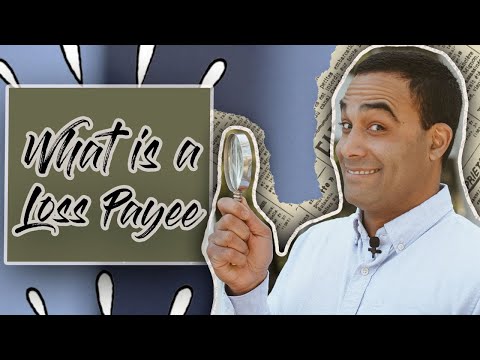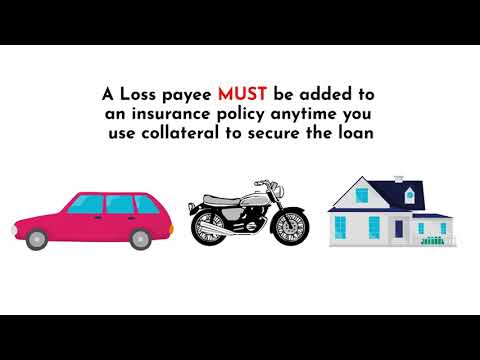When you’re navigating the choppy waters of insurance policies, getting tripped up on the fine print is all too easy. One whirlpool that often catches folks off guard is the elusive loss payee clause. Listen up, because this is one piece of the policy puzzle you can’t afford to ignore if you want to steer your financial ship with confidence.

Decoding the Loss Payee Clause in Your Insurance Policy
Let me give it to you straight: insurance is like a security blanket for your assets. And within that blanket, certain threads are stitched in to ensure that the right people get their due if things go south. That’s where the loss payee clause waltzes in, taking center stage in the array of insurance policy components.

The Essentials of Loss Payee Meaning in Insurance Terms
Ah, the loss payee—this term can tangle your brain faster than your earbuds in your pocket. Put simply, the loss payee is the party luxuriating in the front row, ready to grab the payment baton if a claim sprint finishes. This isn’t just any spectator; they’re usually someone with a vested interest in whatever’s insured, like the lender on your shiny new wheels or the bank behind your home sweet home.

| **Aspect** | **Details** |
|---|---|
| Definition | A loss payee is a third party listed on an insurance policy’s declaration page entitled to claim payments before the policy owner due to a financial interest in the insured property. |
| Function | To ensure that the party with a financial interest in the property receives reimbursement from the insurance carrier in the event of a loss. |
| Loss Payee vs Lienholder | A lienholder retains legal interest in a property or vehicle until it’s paid off, while a loss payee is entitled to insurance claim payouts. They often can be the same entity, but serve different roles. |
| Benefits to Policyholder | Allows the policyholder to secure loans by offering lenders insurance protection, often with no added cost to their own insurance coverage. |
| Requirement by Mortgage Lenders | Mortgage lenders require being a loss payee on a home insurance policy to protect their investment in the property secured by the mortgage. |
| Commercial Application | Lenders require to be listed as loss payees on commercial property insurance policies where property is not owned in full by the borrower. |
| Loss Payee Clause | Specifies that in the event of payment under the policy, it will be made to a loss payee (often a lender) rather than the insured beneficiary. |
| Incidence of Fraud and Damage | Having a loss payee reduces the risk of deliberate damage to property and fraud attempts. |
| Common Usage Areas | Commercial property, auto loans, maritime insurance contracts, and any situation where property is used as collateral for a loan. |
| Contractual Consideration | Commercial crime policies can include a loss payee clause that allows for loss payments to third parties where contractually required and where the third party has an insurable interest. |
| Insurable Interest | The loss payee must have an insurable interest in the property to be listed on the insurance policy. This interest is typically financial, such as a mortgage lender’s interest in a home. |
| Effective Date | Various (Example: Mortgage lenders always require it, while it can be a condition for securing loans for new purchases, e.g., a bakery’s property—data points mentioned range from July 7, 2021, to September 30, 2023) |
Anatomy of a Loss Payee Clause
This clause isn’t just a bunch of mumbo jumbo. It’s a carefully crafted script that dictates who gets paid, how much, and when.
– Standard clause language and structure: “Pay up to the loss payee as their interest may appear” – sounds like legal speak because it is. This means the insurer pays the loss payee keeping in mind their stake in your stuff.
– Legal implications for policyholders and loss payees: If you’re the policyholder, your hands are kinda tied. You must get enough coverage to satisfy your loss payee, or they may give you the stink-eye and call in the loan.
– How the clause affects claim payouts: When disaster strikes, the loss payee steps up to claim their share before you see a dime. It’s first come, first served—and they’re always first in line.

The Interplay Between Loss Payee and Policyholder Rights
There’s a delicate dance between loss payee and policyholder, each with their own rights in the insurance soiree.
– Loss payee’s rights in insurance settlements: Think of the loss payee as having backstage passes. Their rights to the settlement money are VIP because they’ve pumped cash into your asset.
– Policyholder’s obligations under the loss payee clause: As for you, the policyholder, it’s your job to keep the insurance up to par, making sure the loss payee is comfy and the policies are up to their standards.
– Scenario-based practical applications: Imagine a tree playing pinata with your car. With a loan on it, your insurance company will write the check to your lender first. Only after the lender’s slice of the piñata is paid off do you get to whack at the remaining candy.

From Lienholder to Loss Payee: Understanding the Transition
When your asset has a price tag yet to be fully paid, the seller or lender morphs into a loss payee to keep their investment under a watchful eye.
– The transition from lienholder to loss payee: As soon as your signature dries on that loan contract, bam! Your lender slips into the loss payee costume, ready to secure their chunk of change.
– Distinguishing lienholder and loss payee interests: Though their interests may waltz together, they’re not twins. A lienholder has the property’s title until you pay off your loan, while a loss payee is all about protecting their cash flow in case your purchase goes up in flames—literally.
– Influence of laws on lien and loss payee status: Whether you’re in sunny California or bustling New York, the state and Uncle Sam have a say in how the loss payee role plays out. The dance steps might change slightly, depending on where you’re tapping your feet.
Navigating Claims with a Loss Payee: A Step-By-Step Guide
Filing a claim can feel like you’re treading water, but throw in a loss payee, and you might need a life vest. Here’s how to swim through the process without sinking.
– The claims process with a loss payee involved: First off, report the loss, pronto. Your insurer and loss payee need to find out from you, not through the grapevine.
– Tips for a smooth claims process: Keep receipts, snap photos, and jot down details. The more you can show, the less you’ll have to row against the current.
– Claim disputes and loss payee reimbursements: If you and your insurer can’t agree, the loss payee still gets their cut. They’re like the house in Vegas—they always win.
Loss Payee Endorsements: Tailoring the Clause to Specific Needs
Endorsements are like choosing the trim on your vehicle—they customize your insurance policy to the T.
– How endorsements alter the loss payee clause: They’re the fine tuning to ensure the loss payee’s interests are clad in armor.
– Common endorsements seen with loss payees: Sometimes, there’s a twist in the plot—a lender swap or an equipment upgrade. Endorsements keep the story straight.
– When an endorsement might be prudent: If your assets take a new turn—a remodel, a business expansion—looping in an endorsement makes sure the loss payee stays in sync.
Protecting Your Interests: Loss Payee Clauses in Action
This isn’t just theory. Real life has shown that understanding the loss payee clause could be the difference between a financial hiccup and a full-blown cough.
– Case studies on loss payee clauses: From accidental fires to grand theft auto, case studies display how the clause isn’t just a piece of paper; it’s a financial safeguard.
– Loss payee clauses in legal cases: Courts have time and again backed up the loss payee’s front-seat position. It’s not just preference; it’s law.
– Balance between policyholder and loss payee: While the loss payee gets top billing, don’t think you’re left in the dust. The policyholder still gets protection—just after the loss payee’s interests are met.
The Loss Payee Clause in Specialised Scenarios
The loss payee clause isn’t a one-size-fits-all. Businesses and special assets sometimes require a tailor-made suit to cover them properly.
– Loss payee clauses in unique insurance contexts: Got a fleet of ice cream trucks or a treasure chest of fine art? Special assets mean special clauses.
– The variables affecting the clause’s implementation: Depending on what’s insured, you might find the loss payee’s grip tighter or looser—think of it like the difference between a handshake and a bear hug.
Beyond The Basics: Uncommon Questions About Loss Payee Clauses Answered
So, you think you’ve got the gist of it, but what about the questions that linger like the last guest at a party?
– Answering less common questions about loss payee clauses: Don’t worry; we’ve got the A’s to your Q’s, covering everything from “What if my loss payee goes bankrupt?” to “Can I change my loss payee if I refinance?”
– The implications for policyholders and loss payees: Every tweak, every exception, spills out a ripple effect. Knowing them helps you keep your footing when the tide changes.
Future Trends in Loss Payee Agreements
The crystal ball might be a little foggy, but we can still trace the outlines of where loss payee clauses might journey next.
– Evolution of loss payee clauses: With the financial and insurance landscapes ever-shifting, expect these clauses to shimmy and shake to a new rhythm.
– Technology and data’s impact: Big data and AI are joining the party, potentially making loss payee clauses smarter, sharper, and a heck of a lot more intricate.
Empowering Your Financial Security with Knowledge of Loss Payees
Far from being just a dry clause, thinking about the loss payee is about armoring your financial health with knowledge that’s as robust as a suit of armor.
– The significance of understanding loss payee clauses: Knowing the ins and outs can keep you from being blindsided and help you craft an insurance strategy that’s as solid as a rock.
– The value of proactive dialogue with insurers and advisors: It’s like talking to a financial wizard. The more you chat, the more spells you’ll know to protect your castle.
Ensuring Clarity: The Loss Payee’s Role Demystified
Let’s not beat around the bush. The loss payee’s part in this insurance epic isn’t just a cameo—it’s a leading role.
– Recapping the loss payee’s purpose: Like the north star, understanding their place in your policy points you in the right direction.
– Why clear understanding is crucial: Misunderstandings here can tie your funds in knots. With clarity, you can sail through insurance seas with ease.
Charting a Path Forward: Insights on the Loss Payee Clause
As we prepare to dock, keep these nuggets of wisdom close to your chest—your financial treasure chest, that is.
– The loss payee clause’s importance in finance: In personal and business dealings, this clause is the compass that ensures you don’t drift astray.
– Ongoing education and awareness of insurance components: You’ve dipped your toes in today, but keep wading deeper. The ocean of insurance knowledge is vast and full of treasures.
– Seeking personalized advice for your loss payee situation: Your ship is unique, and so is your journey. Find a navigator—an insurance advisor—who can chart your course flawlessly.
By the time you’ve ridden this wave from start to finish, hopefully, you feel more at home with loss payee clauses. Ready to use those insights to trim your sails and chart a course full of smart, secure financial decisions. Now, that being said, always remember: knowledge is the best co-captain on the voyage of finance. So, dive deep into articles like this one, and don’t hesitate to reach out to the experts when you hit uncharted waters. Whether you’re a policyholder or a potential loss payee, understanding these clauses isn’t just some insurance mumbo-jumbo—it’s the rudder that helps steer your financial ship to a safe harbor.
Fun Facts and Trivia: The Quirky World of Loss Payee Clauses
Who’s on First in the Loss Payee World?
Let’s kick things off with a brain-teaser: imagine you’ve just tied the knot, and, wise as an owl, you decided to look at Prenup Examples to protect your assets. Now, what if that prenup included a clause about your beloved abode and its insurance policy? Enter the loss payee – the unsung hero in the mortgage world’s lineup, batting cleanup whenever trouble swings a curveball. If your house has a mortgage (and let’s be real, whose doesn’t?), your lender will insist on being the star player as the loss payee on your homeowner’s insurance policy.
What if the Owner Bites the Dust?
Ever wondered, What Happens To a house When The owner Dies And there Is no will? It’s like a twist in a movie plot that leaves everyone scratching their heads—not unlike trying to figure out The menu Explained. Without a will, the state steps up to bat and dictates who gets the keys to the kingdom—or in this case, the house. But if there’s a mortgage involved with a loss payee named on it, they’re like that undeterred dinner guest who always gets their share first.
Home Equity Loans: A Plot Twist
Ah, the home equity loan, much like the rocket mortgage home equity loan, adds a splash of excitement to the homeowner saga. Picture this: you borrow against the equity of your home, and wham! You’re now in a love triangle with the lender who becomes another loss payee on your insurance policy. They’re like that side character in your financial story who’s crucial to the plot but often overlooked until it’s their time to shine.
The Karate Kid of Loss Payee Clauses
Now, if loss payee clauses were a martial arts expert, they’d be Tiger Schulmann– they’ve got the moves to protect lenders from financial kung fu punches. Just as in martial arts, where every move matters, the specific wording in a loss payee clause can be the difference between a knockout or a tap out when disaster strikes your property.
Loss Payee Meets Endorsement Insurance
And speaking of protection, our buddy the loss payee clause is nothing without its trusty sidekick: “endorsement insurance”. It’s like having a backstage pass to a rock concert; it gives added privileges on your insurance policy, ensuring the loss payee stays in the VIP section should things go south with the property.
Well, there you have it, folks! A cheeky dive into the world of loss payee clauses. Sure, it might seem about as dry as a stale biscuit on a Sunday morning, but knowing a thing or two about how they work can save you more than just a penny for a rainy day. Remember, when it comes to the home game, having these clauses squared away means you’re playing to win!

What does it mean to be listed as loss payee?
– Hey, if you’re listed as a loss payee, it’s as if you’ve snagged a safety net for your investment. In layman’s terms, it means you’re the party that gets paid first if something bad happens to whatever is insured, say a car or a house. It’s the lender’s way of saying, “I’ve got my eye on that dough if things go south!”
Is a loss payee the same as a lienholder?
– Not quite the same, but they’re definitely kissing cousins! A lienholder is someone who’s got a legal claim on your property because you owe them money, typically from a loan, while a loss payee is the one who gets the insurance check if said property gets damaged. It’s like they both have a stake in your stuff, but they’re playing different roles.
What is the loss payee clause in Malaysia?
– Alright, picture this in Malaysia: the loss payee clause is a bit like a VIP pass for lenders. It’s part of an insurance contract that says, “Hey, if anything gets wrecked, the loss payee gets paid first.” Think of it as a financial bodyguard that ensures the lender’s investment is protected, no matter the monsoon or mishap.
What are the benefits of a loss payee?
– The perks of a loss payee? Well, it’s pretty peachy! As a loss payee, lenders can sleep tight knowing that if disaster strikes, their investment stays protected. They get the insurance payout directly, which means no chasing after funds. It’s like having an ace up your sleeve—ensuring you don’t lose out if something goes sideways.
Who should be listed as loss payee?
– Picture this: you’re lending your buddy some cash to buy a shiny new car. You’d want to be listed as the loss payee, right? Basically, any lender, like banks or financing companies, or anyone with a financial stake in something valuable should have their name on that dotted line. It’s like staking your claim to make sure you’re not left out in the cold if trouble hits.
Can an individual be a loss payee?
– An individual as a loss payee? Sure thing, it can happen! Say you lend your neighbor some dough to fix up their classic hot rod. If you’re smart, you’ll have yourself listed as the loss payee on their insurance policy. That way, if that ride ends up as scrap metal after a fender-bender, you’re the one getting the check to cover your loan. Smart move, right?
What is an example of a loss payee?
– For a real-world example, imagine your local bank lending you money for a brand-spanking-new car. If they’re smart cookies, they’ll be the loss payee on your auto insurance. So, if your shiny ride turns into a heap of metal in a crash, the bank gets paid what you still owe ’em. It’s like the bank saying, “We’re getting our piece of the pie, come rain or high water.”
How do I remove a loss payee?
– Want to give a loss payee the old heave-ho? You’ll need to show the insurance company that the debt’s been paid in full, usually with a letter from the lender. Once they give the thumb’s up, the insurer can scrub the loss payee from the policy faster than a kid erases a chalkboard. Freedom, at last!
What is the difference between named insured and loss payee?
– Butting heads between named insured and loss payee? Think of it this way: named insured is you, covered for losses and liabilities. The loss payee? They’re waiting in the wings, ready to grab the insurance money if the covered item gets totaled — and only for the value they have a stake in. It’s like the difference between the star of the show and their understudy.
Can you have two loss payees?
– Double trouble with two loss payees? Sure, it can happen. Sometimes a property’s got more bling than one lender can handle, so another jumps in to share the risk. Think of it like siblings both wanting a piece of the pie — it gets split so each one gets their fair share if disaster dishes out the damage.
What is the loss payee clause on a mortgage?
– On a mortgage, the loss payee clause is your lender saying, “Hey, if your house turns to ashes or gets trashed by a tornado, I’m first in line for the insurance payout.” Essentially, they’re holding the winning ticket to make sure their loan gets paid, even if Mother Nature goes wild.
What is the first loss payee clause?
– First loss payee clause, coming right up! It’s like being the captain of the cash recovery squad. If multiple folks have a financial interest in a property and it goes kaput, the first loss payee is top dog — they get their money first and foremost. Everyone else has to wait in line.
Is a loss payee a lender?
– In the finance world, a lender often doubles as the loss payee because they’ve got skin in the game. They foot the bill initially, so it stands to reason they want their bucks back if the goods go belly up. So, yep, loss payee is often just another hat that the lender wears.
Is a loss payee an additional interest?
– You might be scratching your head, thinking, “Is a loss payee an additional interest?” Well, not exactly. “Additional interest” often means someone benefits from the policy but doesn’t get financial protection, like a landlord might. But a loss payee? They’ve got money on the line and are betting on getting paid if the chips are down.
What is the difference between mortgage and loss payee?
– Mortgage vs. loss payee: they’re two peas in a pod but not quite twins. Your mortgage is the big loan you snagged to buy your house, and the lender? They’re a loss payee on your insurance because if a disaster were to hit the fan, they want to make darn sure they get their slice of the insurance payout pie.
Is the loss payee the same as the beneficiary?
– If you’re juggling the terms “loss payee” and “beneficiary,” don’t drop the ball—they’re different beasts. A beneficiary is like the golden child who benefits from your insurance when you kick the bucket. A loss payee? They’re the one holding the bag, waiting for their payout if your stuff gets totaled.
What is the difference between named insured and loss payee?
– Pitting named insured against loss payee again? Here’s the rerun: If you’re the named insured, you’re the main squeeze in the insurance relationship. Damage or lawsuits, you’re covered. The loss payee remains in the shadows, fingers crossed, that if the insured stuff gets wrecked, they pocket the insurance cash first.
What is an example of a loss payee?
– Imagine your buddy Joe loans you cash for that sparkling new jet ski, and to cover his end, he’s the loss payee on your insurance. So, if the jet ski pulls a Titanic, insurance pays Joe first to settle your debt. Joe’s the star of the show in that scenario, even if he’s behind the scenes!
What is the difference between insured and loss payee?
– Last round, folks! Insured versus loss payee is like comparing apples and oranges. The insured (that’s you) holds the policy and gets covered for mishaps and calamities. The loss payee sits patiently in the wings, with no coverage for themselves but a direct line to the cash if the insured’s goodies get totaled.



